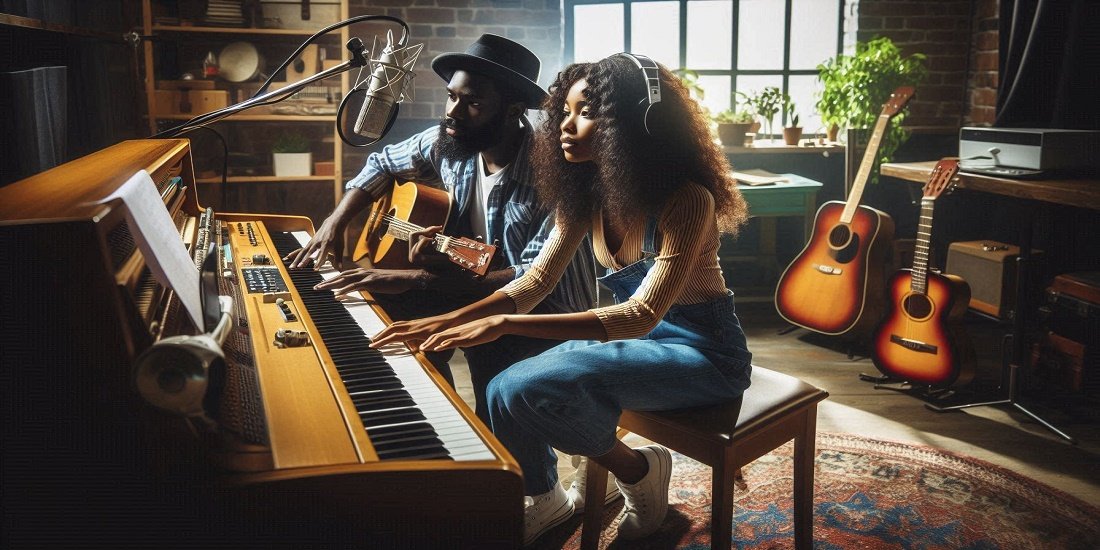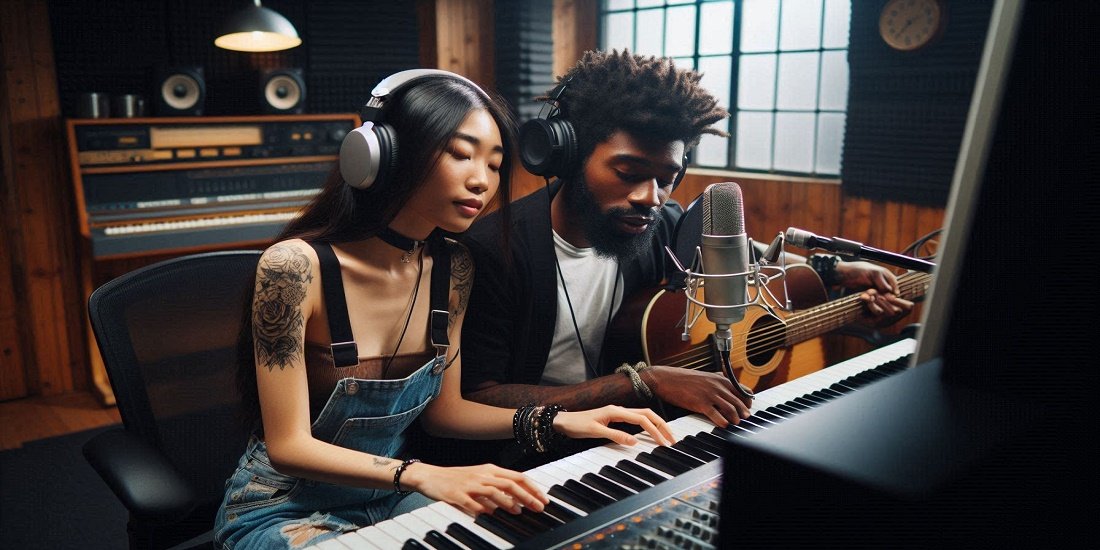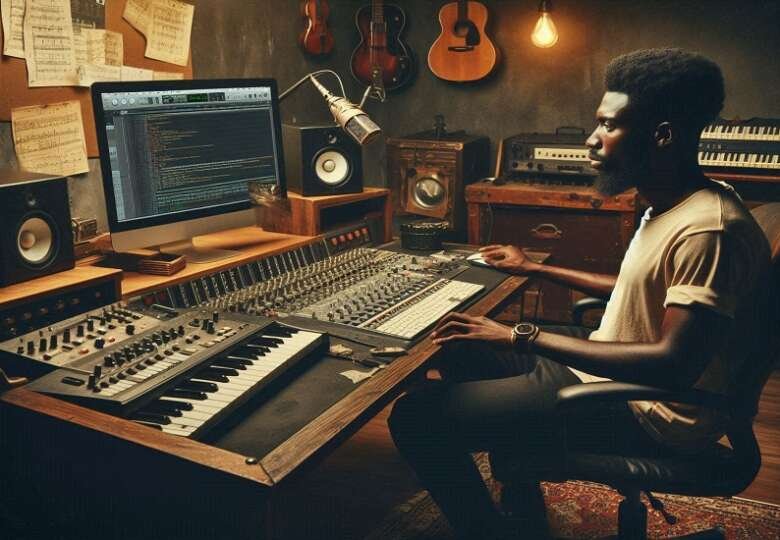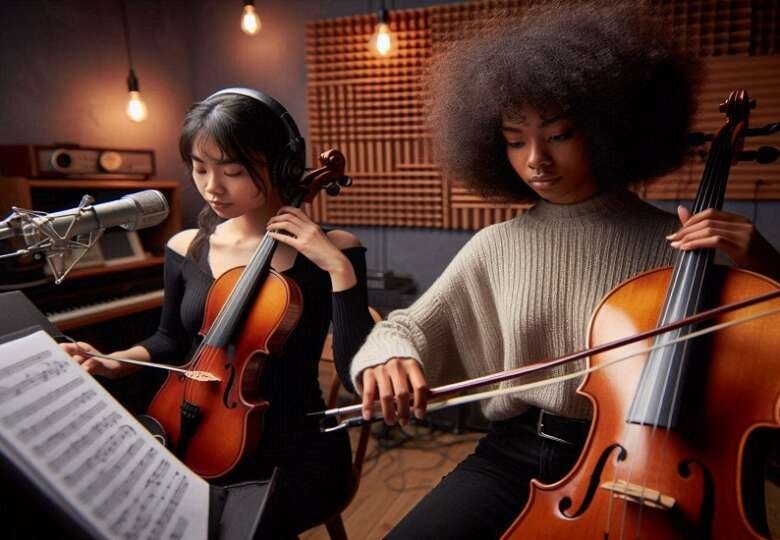DBecoming A Singer / Songwriter
To Become a successful singer-songwriter involves a combination of skills & dedication. Here are some top tips & essential steps to help you achieve your goals:
- Learn to play an instrument & to Read Music: Understanding pitch, speed, & rhythm is crucial. Take a music theory class or explore online resources. Most songwriters use a guitar or piano. Choose an instrument you’re interested in & practice regularly.
- Hone Your Songwriting Abilities: By Crafting Compelling Lyrics & Writing meaningful & relatable Songs.
- Create Memorable Melodies & Hooks: Experiment with different chord progressions & melodies. Learn about verses, choruses, bridges, & hooks.
- Improve Your Vocal Skills: Work on your vocal range, breath control, & expression. Explore various singing styles & techniques. They say practice makes perfect.
- Seek Feedback: Record yourself & get input from peers or mentors.
- Build Your Personal Brand: Create a website & use social media to Engage with Your Audience Use social media to connect with fans.
- Find Your Unique Voice: Be original & authentic.
- Seek Performance Opportunities: Perform at local venues, open mics, & events.
Remember, persistence & passion are a essential part. Keep writing, performing, & learning to achieve your singer-songwriter dreams.
For more detailed guidance, you can explore resources like

wikiHow’s guide, The Ultimate Guide on How to Become a Singer Songwriter, & The Ultimate Guide to Becoming a Successful Singer-Songwriter.
There are many more resources for you to explore your dream via internet search. You will find links futher down the page.
Find Your Inspiration Listen to a Variety of Music: Explore different genres & artists to understand various styles & techniques. Collaborate with Others
Network with Other Musicians: Join local music groups, attend open mics, & connect with fellow artists.
Co-write Songs: Working with other songwriters can bring new perspectives & ideas to your music. Invest in basic recording equipment like a good microphone, audio interface, & recording software. Use services like Spotify, Apple Music, & Bandcamp to distribute your music widely. Knowing what you love can help shape your unique sound. Use Any Musical Influences?: Who inspire you? Drawing from your influences can help you develop your style.
Related Posts
There are many things you can do to improve your chance of success with the age of social media record companies our no longer in charge of what can be achieved, (You are) it’s all about how much you put into what you want to achieve.
Experiment: Don’t be afraid to try different approaches. Experiment with chord progressions, melodies, & song structures. Sometimes, the unexpected can lead to magic.
Edit & Revise: Writing is rewriting. Polish your lyrics, melodies, & arrangements. Be open to refining your work until it feels just right
Trust Your Gut: Follow your instincts. If something feels authentic & resonates with you, it’s likely to connect with your audience too.
Write: Consistency matters. Set aside time to write regularly. Even if you’re not feeling inspired, the act of writing can spark creativity.
Remember, every songwriter faces creative challenges, but persistence & passion will help you break through those ruts.
- Singer Song-Writing Links
- Other Helpful Links
- Accumsan et iusto odio dignissim qui blandit
- Paesent luptatum zzril delenit augue duis
- Sed ut perspiciatis, unde omnis iste natus error
- St voluptatem accusantium doloremque
- Licensing & Royalties: Links
- Dolore eu feugiat nulla facilisis at vero eros et
- Accumsan et iusto odio dignissim qui blandit
- Paesent luptatum zzril delenit augue duis
- Sed ut perspiciatis, unde omnis iste natus error
- St voluptatem accusantium doloremque
Licensing & Royalties:
Sound Recording Copyright: This covers the actual recorded performance of a song. It’s owned by the person or entity that financed the recording often a Record Label. When your song is streamed, downloaded, or played on the radio, you earn royalties from sound recordings.
Tip: Ensure your music is properly registered & copyrighted to qualify for these royalties.
Songwriting Copyright: Songwriting copyright pertains to the composition the lyrics & melody.
As a songwriter, you earn royalties when your song is performed live, played on the radio, or used in TV shows, movies, & commercials.
Tip: Join a performance rights organization (PRO) like BMI, ASCAP, or SESAC to collect these royalties.
Mechanical Royalties: These are paid when your song is reproduced e.g. on CDs, Vinyl, Digital Downloads, or Streaming Platforms.
Mechanical royalty rates are determined by law Currently 9.1 cents per copy for songs under 5 minutes.
Collection agencies like the Harry Fox Agency handle mechanical royalties.
Performance Royalties: These come from public performances of your song Live Concerts, Radio, TV, Streaming services. PROs collect & distribute performance royalties to songwriters & publishers.
Tip: Register your songs with a PRO to receive these royalties.
Sync Licensing: When your song is used in TV Shows, Films, Ads, or Video Games, you earn sync licensing fees.
Negotiate sync licenses directly or through music libraries.
Tip: Sync licensing can be lucrative explore opportunities for your music. Remember, understanding these royalties empowers you to navigate contracts, negotiate fair percentages, & maximize your earnings. Keep creating & collecting those royalties.



